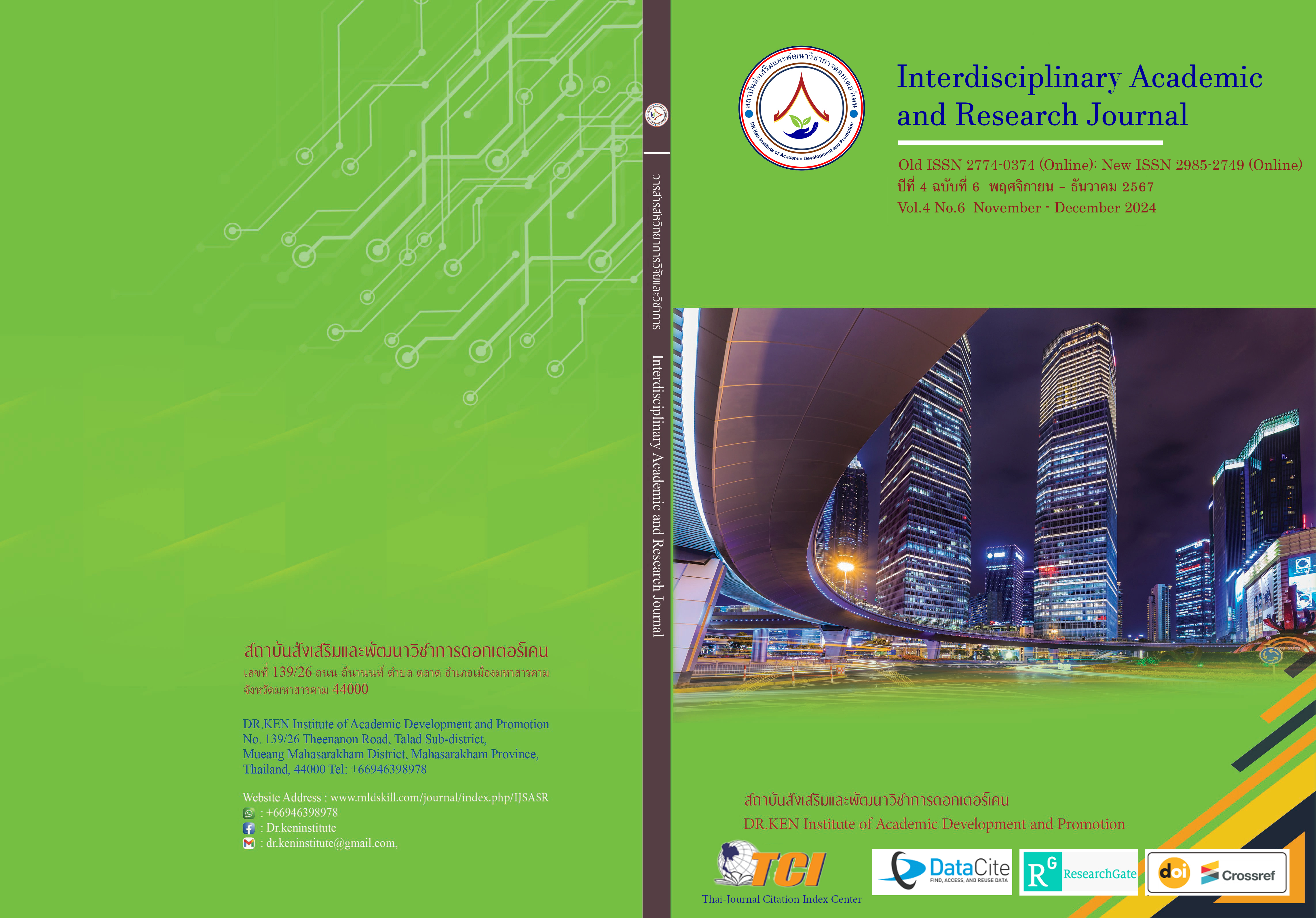Development of Digital Literacy Evaluation Model for Tourism Management of Undergraduate Students
DOI:
https://doi.org/10.60027/iarj.2024.278398Keywords:
Digital Literacy, Digital Literacy Evaluation Model, Tourism Management of Undergraduate StudentsAbstract
Background and Aims: The digital economy, digital transformation of tourism enterprises, and new forms of employment have created new demands for the study and future career development of tourism management among undergraduate students. The digital literacy level of these students directly impacts their future employment opportunities, skill development, and even the pace of digital development in tourism professional education. The objectives of this research are 1) to extract the components of digital literacy in the tourism management of undergraduate students and 2) to develop a digital literacy evaluation model for the tourism management of undergraduate students.
Methodology: The research reviews relevant theoretical concepts, including digital literacy and information literacy. The processes in this research are as follows: 1) reviewing the theoretical basis of the study 2) defining related concepts such as digital literacy, information literacy, etc. Reviewed research on the digital literacy for tourism management of undergraduate students, providing a theoretical and practical foundation for this paper's research. 2) To take 1,308 tourism management undergraduate students in China as the survey subjects, the current status of their digital literacy was investigated. To analyze the survey results and extract the components of digital literacy among tourism management undergraduate students. 3) We selected 21 experts, used the Delphi method to determine the components of the digital literacy evaluation model, and then used the network analysis method to determine the weight of each component. Finally, we designed a digital literacy evaluation model that is suitable for undergraduate students studying tourism management. Results: The study's results indicate that the model clearly demonstrates the relationships and relative importance of the components of tourism management for undergraduate students. Teachers can effectively use this model to assess students' digital literacy levels and provide them with personalized support and guidance. Students can use this model to improve their digital literacy levels and adapt to the digital age's development sequentially and purposefully.
Conclusion: The model clearly shows how tourist management instructional features are weighted. Teachers can measure students' digital literacy with this strategy. Students' digital tourist management skills are improving as teachers customize aid and advise. This method could streamline and personalize education to better prepare students for tourism.
References
Adeyinka-Ojo, S., Lee, S., Abdullah, S.K., Teo, J. (2020). Hospitality and tourism education in an emerging digital economy. Hospitality and tourism education, 2, 113-125.
Allan, M., & Grudziecki, J. (2006). DigEuLit: Concepts and Tools for Digital Literacy Development. ITALICS. 5 (4), 10.11120/ital.2006.05040249.
Binytska, K. (2023). FEATURES OF DIGITALIZATION IN THE PROCESS OF PROFESSIONAL TRAINING OF SPECIALISTS IN THE TOURISM INDUSTRY. Continuing Professional Education: Theory and Practice, 2(75), 53–60. https://doi.org/10.28925/1609-8595.2023.2.6
Buhalis, D., & Law, R. (2008). Progress in information technology and tourism management: 20 years on and 10 years after the Internet—The state of eTourism research. Tourism Management, 29(4), 609-623.
Caldevilla-Domínguez, D., Martínez-Sala, A.M., & Barrientos-Báez, A. (2021). Tourism and ICT. Bibliometric Study on Digital Literacy in Higher Education. Education Science, 11, 1-17.
Cantoni, L., & Xiang, Z., (2013). Information and Communication Technologies in Tourism. Publisher: Springer
Eshet-Alkalai, Y. (2004). Digital Literacy: A Conceptual Framework for Survival Skill sin the Digital Era. Journal of Educational Multimedia and Hypermedia, 1, 93-106.
Ferrari, A., & Punie, Y. (2013). DIGCOMP: A framework for developing and understanding digital competence in Europe. Luxembourg: Publications Office of the European Union
Fu, Y., Zhang, B., Hu, W. (2021). Deconstruction and cultivation of in-formation literacy of tourism management major in the era of all media. Journal of Wuhan Polytechnic University, 2, 112-119.
Gilster, P. (1997), Digital literacy. New York: Wiley Computer Publications.
Huang, R., Lu, Y., & Ba, S. (2017). An empirical study of the cross-channel effects between web and mobile shopping channels. Information & Management, 54(1), 13-29.
JISC (2014). Developing Digital Literacies. Retrieved Mar 30, 2023 from https://www.jisc.ac.uk/guides/developing-digital-literacies.
Ling, Z. (2020). Current status, problems and educational paths of digital literacy among Chinese college students. Information Theory and Practice, 7, 43-53.
Liu, Q. (2019). "Double first-class" construction of college undergraduates' digital literacy status and its influencing factors. Master's dissertation: East China Normal University.
Martin, A & Grudziecki, J. (2006). DigEuLit: Concepts and Tools for Digital Literacy Development. Innovation in Teaching and Learning in Information and Computer Sciences, 5, 249-267.
Moran, E. (2004). Complexity Theory and Educational Issues. Translated by Chen Yizhuang. Peking University Press.
Ng, W. (2012). Can we teach digital natives digital literacy? Computers & Education, 59(3), 1065-1078.
Ping, Y. (2018). Research on strategies to improve college students’ digital literacy in the digital environment. Doctoral dissertation: Shanghai International Studies University.
UNESCO (2018). Digital literacy. Retrieved from: https://unevoc.unesco.org/home/TVETipedia+Glossary/show=term/term=Digital+literacy.
Uysal, D., & Kilic, İ. (2022). Evaluation of Tourism Undergraduates’ 21st Century Learner Skills Usage from Pedagogical Perspective. Journal of Tourism & Gastronomy Studies, 10(2), 1196-1214.
Wang, H. (2019). Research on the current situation and development path of media literacy education in tourism colleges. News World, 10, 76-80.
Wang, Y., Yang, X., Hu, W., Wang, J. (2013). From digital literacy to digital competence: conceptual evolution, components and integration model. Journal of Distance Education, 3, 24-29.
Xiao, J. (2006). Digital literacy. China Distance Education, 5, 32-33.
Downloads
Published
How to Cite
Issue
Section
License
Copyright (c) 2024 Interdisciplinary Academic and Research Journal

This work is licensed under a Creative Commons Attribution-NonCommercial-NoDerivatives 4.0 International License.
Copyright on any article in the Interdisciplinary Academic and Research Journal is retained by the author(s) under the under the Creative Commons Attribution-NonCommercial-NoDerivatives 4.0 International License. Permission to use text, content, images, etc. of publication. Any user to read, download, copy, distribute, print, search, or link to the full texts of articles, crawl them for indexing, pass them as data to software, or use them for any other lawful purpose. But do not use it for commercial use or with the intent to benefit any business.
















.png)


